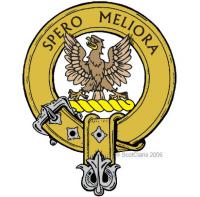
Clan Sandilands
The name Sandilands is of territorial origin, coming from the lands of the same name in Clydesdale.
James Sandilands received from his brother in law, Lord Douglas, the lands of Calder in Lothian. However James was later killed leading the Clan Sandilands during fighting against the English at the Battle of Halidon Hill in 1333.
The son of the James Sandilands killed in 1333, also called James, was sent to England as a hostage for James I of Scotland, and did not return until two years before his death. James was the presumptive heir to the estates of Clan Douglas and was in line to have inherited them when the 2nd Earl of Douglas died, however the lands and titles went to Douglas’s son, George Douglas, instead. James Sandilands was succeeded by his son John.
The Sandilands and Douglases differed when it came to their support of James II. The Douglas clan had an unshakeable belief in the king, which the Sandilands didn’t. This brought a lot of tension between the two close families, even to the point of murder. On the orders of members of Clan Douglas, Patrick Thornton assassinated both chief of Clan Sandilands, John Sandilands, and his uncle James. John’s son, James, inherited the Sandilands estates. James married Margaret Kinlock of Cruvie, and their son James Sandilands of Cruvie began the line of Sandilands who went on to become the Lords of Abercrombie.
The Protestant reformer John Knox was a friend of Sir James Sandilands of Calder. Sandilands was the preceptor of the Knights of St John, a powerful religious and military order whose headquarters were at the Priory of Torphichen in West Lothian.
Sandilands managed to gain a grant for a lot of the lands after the Order was suppressed. However, this grant came at the cost of ten thousand crowns in gold to the Crown, and a further annual rent of five hundred merks. The preceptors used to sit as peers in Parliament under the title of ‘Lord St. John of Torphichen’, a rare instance at the time of a title belonging to an office rather than being hereditary and descending down through any one family. Sir James was created Lord Torphichen and managed to keep his seat in parliament. When he died Sandilands was childless and so his title passed to his brother’s grandson, James.
Sir James Sandilands of Slamannan, the half brother of the first Lord Torphichen, was a Gentleman of the Bedchamber to James VI and then later on he was the guardian of Blackness Castle, which stands on the shores of the Firth of the Forth. The fourth Lord Torphichen, John Sandilands (son of the second and brother of the third), was a Royalist, supporting Charles I during the Civil War. However, he was against the plan to rescue the king by invading England after he had been handed over to Parliamentarians by the Scots army. The plan, known as the Engagement, was poorly conceived and poorly executed, ending in the Engagers army being routed by Oliver Cromwell’s at the Battle of Preston in 1648.
James, seventh Lord Torphichen, was a soldier and a politician. In 1704 he first took his seat in the Scottish Parliament and supported the 1707 Treaty of Union. Whilst in the army, he served on mainland Europe, only returning to Scotland at the outbreak of the rising of 1715. The Clan Sandilands were against the Jacobites and fought on the British governments side. The seventh Lord led his Sandilands men in the Governmental army at the Battle of Sheriffmuir, where they gained a strategic victory over the Jacobite rebels. Seven years later King George I appointed him as one of the Commissioners of Police. In 1745, during the second Jacobite uprising, James’s eldest son was wounded fighting against Bonnie Prince Charlie’s forces, and he later died from tuberculosis. This meant that Walter, the seventh Lord’s second son, inherited the title. Walter had a successful career in law, and was the sheriff of Midlothian when his father died in 1753. His son James was a colonel in the Coldstream Guards, and between 1790 and 1800 he sat in the House of Lords as an elected representative peer. James’s first cousin, also called James, succeeded him, and it is from the cousin whom the current Lord Torphichen, James Andrew Douglas Sandilands, is lineally descended.






